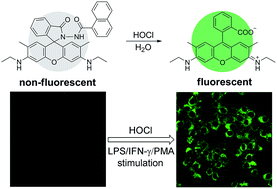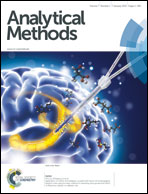A rhodamine hydrazide-based fluorescent probe for sensitive and selective detection of hypochlorous acid and its application in living cells†
Abstract
A simple rhodamine hydrazide-based fluorescent turn-on probe was developed for fluorescence detection of hypochlorous acid (HOCl) in aqueous media and living cells. On the basis of a HOCl-mediated oxidation–hydrolysis mechanism, this new probe features high sensitivity, comparatively wide pH detection range, fast-response, and great photostability toward HOCl in aqueous solutions. Owing to its hydrazide structure, the probe also exhibits excellent selectivity for HOCl over a panel of biologically relevant reactive oxygen species (ROS), reactive nitrogen species (RNS), and most of the common metal ions in neutral buffer. Particularly, with cell membrane permeability and low cytotoxicity, the probe is capable of responding to intracellular changes in HOCl levels in living cells by fluorescence imaging and flow cytometry.


 Please wait while we load your content...
Please wait while we load your content...